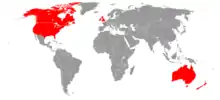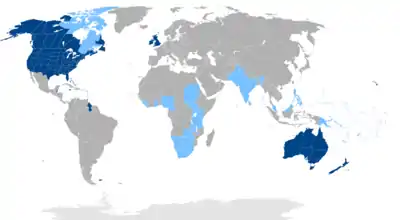English-speaking world
The English–speaking world, also known as the Anglosphere, refers to the over two billion people who speak English (as of the 2000s),[1][2] making English the largest language by number of speakers, and the third largest language by number of native speakers after Spanish and Mandarin Chinese.

England, a part of the United Kingdom, is the birthplace of the English language, and the modern form of the language has been spreading around the world since the 17th century by the worldwide influence of the United Kingdom, and more recently, the United States. Through all types of printed and electronic media of these countries, English has become the leading language of international discourse and the lingua franca in many regions and professional contexts such as science, navigation and law.[3] The United Kingdom remains the largest English-speaking country in Europe.
Estimates that include second-language speakers vary greatly, from 470 million to more than 2 billion.[2] David Crystal calculates that, as of 2003, non-native speakers outnumbered native speakers by a ratio of 3 to 1.[4] When combining native and non-native speakers, English is the most widely spoken language worldwide.
Besides the major varieties of English, such as American English, Australian English, British English, Canadian English, Irish English, New Zealand English, Singapore English, and their sub-varieties, countries such as South Africa, India, Nigeria, the Philippines, Jamaica, Malaysia and Trinidad and Tobago also have millions of native speakers of dialect continua ranging from English-based creole languages to Standard English. Other countries, such as Ghana and Uganda, also use English as their primary official languages.
As of 2012, India claims to have the world's second-largest English-speaking population. The most reliable estimate is around 10% of its population (125 million people), second only to the United States, and is expected to quadruple in the following decade.[5]
Majority English-speaking countries

English is the primary natively spoken language in several countries and territories. Five of the largest of these are sometimes described as the "core Anglosphere";[6][7][8] they are the United States of America (with at least 231 million native English speakers),[9] the United Kingdom (60 million),[10][11][12] Canada (19 million),[13] Australia (at least 17 million),[14] and New Zealand (4.8 million).[15] English is also the primary natively spoken language in the Republic of Ireland, Jamaica, Trinidad and Tobago, Guyana, The Bahamas, Belize, Grenada, Barbados, the United States Virgin Islands, the Channel Islands, Antigua and Barbuda, Dominica, Bermuda, Saint Vincent and the Grenadines, the Isle of Man, the Turks and Caicos Islands, Saint Kitts and Nevis, the Cayman Islands, Guam, Gibraltar, the British Virgin Islands, Anguilla, the Falkland Islands, Montserrat, Saint Helena, Ascension and Tristan da Cunha, the British Indian Ocean Territory, the Pitcairn Islands, and South Georgia and the South Sandwich Islands.
Pie chart showing the percentage of native English speakers living in "inner circle" English-speaking countries. Native speakers are now substantially outnumbered worldwide by second-language speakers of English (not counted in this chart).
Countries where English is an official language
In some countries where English is not the most spoken language, it is an official language. These countries include Belize, Botswana, Cameroon (co-official with French), Eswatini (Swaziland), Fiji, Guyana,Ghana, India, Kenya, Kiribati, Lesotho, Liberia, Malaysia, Malta, the Marshall Islands, Mauritius, the Federated States of Micronesia, Namibia, Nigeria, Pakistan, Palau, Papua New Guinea, the Philippines, Rwanda, Saint Lucia, Samoa, Seychelles, Sierra Leone, Singapore, the Solomon Islands, Sri Lanka, Sudan, South Africa, South Sudan, Tanzania, The Gambia, Uganda, Zambia, and Zimbabwe. There also are countries where in a part of the territory English became a co-official language, in Colombia's San Andrés y Providencia, Hong Kong, Honduras's Bay Islands, and Nicaragua's Mosquito Coast. This was a result of the influence of British colonization and American colonization in these areas.
India has the largest number of second-language speakers of English (see Indian English); Crystal (2004) claims that combining native and non-native speakers, India has more people who speak or understand English than any other country in the world. However, most scholars and research that has been conducted dispute his assertions.[16] Pakistan also has the English language (Pakistani English) as a second official language after the Urdu language as the result of British rule (Raj). Sri Lanka and the Philippines use English as their third and second official language after Sinhala and Tamil, and Filipino, respectively.
English is one of the eleven official languages that are given equal status in South Africa (South African English), where there are 4.8 million native English speakers.[17] It is also the official language in current dependent territories of Australia (Norfolk Island, Christmas Island and Cocos (Keeling) Islands) and of the United States of America (American Samoa, Guam, Northern Mariana Islands, Puerto Rico (in Puerto Rico, English is co-official with Spanish) and the US Virgin Islands),[18] and Hong Kong Special Administrative Region of the People's Republic of China.
Although the United States federal government has no official languages, English has been given official status by 32 of the 50 US state governments.[19][20] Furthermore, per United States nationality law, the process of becoming a naturalized citizen of the US entails a basic English proficiency test, which may be the most prominent example of the claim of the nation not having an official language being belied by policy realities.
Although falling short of official status, English is also an important language in several former colonies and protectorates of the United Kingdom, such as Bahrain, Bangladesh, Brunei, Cyprus and the United Arab Emirates.
English as a global language

States and territories in which English is an official, but not the majority language
Because English is so widely spoken, it has often been referred to as a "world language", the lingua franca of the modern era,[21] and while it is not an official language in most countries, it is currently the language most often taught as a foreign language.[22][23] It is, by international treaty, the official language for aeronautical[24] and maritime[25] communications. English is one of the official languages of the United Nations and many other international organizations, including the International Olympic Committee. It is also one of two co-official languages for astronauts (besides the Russian language) serving on board the International Space Station.
English is studied most often in the European Union, and the perception of the usefulness of foreign languages among Europeans is 67 per cent in favour of English ahead of 17 per cent for German and 16 per cent for French (as of 2012). Among some of the non-English-speaking EU countries, the following percentages of the adult population claimed to be able to converse in English in 2012: 90 per cent in the Netherlands, 89 per cent in Malta, 86 per cent in Sweden and Denmark, 73 per cent in Cyprus, Croatia, and Austria, 70 per cent in Finland, and over 50 per cent in Greece, Belgium, Luxembourg, Slovenia, and Germany. In 2012, excluding native speakers, 38 per cent of Europeans consider that they can speak English.[26]
Books, magazines, and newspapers written in English are available in many countries around the world, and English is the most commonly used language in the sciences[21] with Science Citation Index reporting as early as 1997 that 95% of its articles were written in English, even though only half of them came from authors in English-speaking countries.
In publishing, English literature predominates considerably with 28 per cent of all books published in the world [Leclerc 2011] and 30 per cent of web content in 2011 (down from 50 per cent in 2000).[23]
This increasing use of the English language globally has had a large impact on many other languages, leading to language shift and even language death,[27] and to claims of linguistic imperialism. English itself has become more open to language shift as multiple regional varieties feed back into the language as a whole.[28]
References
- "Crystal, David. The language revolution. John Wiley & Sons, 2004".
- Crystal, David (2008). "Two thousand million?". English Today. 24: 3–6. doi:10.1017/S0266078408000023.
- The Routes of English.
- Crystal, David (2003). English as a Global Language (2nd ed.). Cambridge University Press. p. 69. ISBN 978-0-521-53032-3.
- Masani, Zareer. "English or Hinglish - which will India choose?". BBC News. BBC. Retrieved 12 November 2019.
- Mycock, Andrew; Wellings, Ben. "The UK after Brexit: Can and Will the Anglosphere Replace the EU?" (PDF).
...the core Anglosphere states – the USA, the UK, Canada, Australia and New Zealand...
- Press, Stanford University. "The Anglosphere: A Genealogy of a Racialized Identity in International Relations | Srdjan Vucetic". www.sup.org.
- "Getting Real About the Anglosphere". 17 February 2020.
...from what might be called the “core” Anglosphere nations: Britain, Canada, New Zealand, Australia, and the United States;
- Ryan 2013, Table 1.
- Office for National Statistics 2013, Key Points.
- National Records of Scotland 2013.
- Northern Ireland Statistics and Research Agency 2012, Table KS207NI: Main Language.
- Statistics Canada 2014.
- Australian Bureau of Statistics 2013.
- Statistics New Zealand 2014.
- Crystal 2004b.
- Statistics South Africa 2012, Table 2.5 Population by first language spoken and province (number).
- Nancy Morris (1995). Puerto Rico: Culture, Politics, and Identity. Praeger/Greenwood. p. 62. ISBN 978-0-275-95228-0.
- "U.S. English, Inc". U.S. English. Archived from the original on 6 January 2010. Retrieved 21 April 2010.
- "U.S. English Chairman Applauds West Virginia Bill to Declare English the States Official Language". U.S. English. Archived from the original on 1 April 2016. Retrieved 23 March 2016.
- David Graddol (1997). "The Future of English?" (PDF). The British Council. Archived from the original (PDF) on 19 February 2007. Retrieved 15 April 2007.
- Crystal, David (2003a). English as a Global Language (2nd ed.). Cambridge University Press. p. 69. ISBN 978-0-521-53032-3. Retrieved 4 February 2015. Lay summary (PDF) – Library of Congress (sample) (4 February 2015).
- Northrup 2013.
- "ICAO Promotes Aviation Safety by Endorsing English Language Testing". International Civil Aviation Organization. 13 October 2011.
- "IMO Standard Marine Communication Phrases". International Maritime Organization. Archived from the original on 27 December 2003.
- European Commission (June 2012). Special Eurobarometer 386: Europeans and Their Languages (PDF) (Report). Eurobarometer Special Surveys. Retrieved 12 February 2015. Lay summary (PDF) (27 March 2015).
- David Crystal (2000) Language Death, Preface; viii, Cambridge University Press, Cambridge
- Jambor, Paul Z. (April 2007). "English Language Imperialism: Points of View". Journal of English as an International Language. 2: 103–123.
Bibliography
- Australian Bureau of Statistics (28 March 2013). "2011 Census QuickStats: Australia". Retrieved 25 March 2015.
- Afhan Meytiyev (26 September 2013). "English and diplomacy" (PDF). Scotland's Census 2011. Retrieved 25 March 2020.
- Bao, Z. (2006). "Variation in Nonnative Varieties of English". In Brown, Keith (ed.). Encyclopedia of language & linguistics. Elsevier. pp. 377–380. doi:10.1016/B0-08-044854-2/04257-7. ISBN 978-0-08-044299-0. Lay summary (6 February 2015). – via ScienceDirect (Subscription may be required or content may be available in libraries.)
- Crystal, David (19 November 2004b). "Subcontinent Raises Its Voice". The Guardian. Retrieved 4 February 2015.
- Crystal, David (2006). "Chapter 9: English worldwide". In Denison, David; Hogg, Richard M. (eds.). A History of the English language. Cambridge University Press. pp. 420–439. ISBN 978-0-511-16893-2.
- National Records of Scotland (26 September 2013). "Census 2011: Release 2A". Scotland's Census 2011. Retrieved 25 March 2015.
- "The Routes of English". 1 August 2015.
- Northern Ireland Statistics and Research Agency (11 December 2012). "Census 2011: Key Statistics for Northern Ireland December 2012" (PDF). Statistics Bulletin. Table KS207NI: Main Language. Retrieved 16 December 2014.
- Northrup, David (20 March 2013). How English Became the Global Language. Palgrave Macmillan. ISBN 978-1-137-30306-6. Retrieved 25 March 2015. Lay summary (25 March 2015).
- Office for National Statistics (4 March 2013). "Language in England and Wales, 2011". 2011 Census Analysis. Retrieved 16 December 2014.
- Ryan, Camille (August 2013). "Language Use in the United States: 2011" (PDF). American Community Survey Reports. p. 1. Archived from the original (PDF) on 2016-02-05. Retrieved 16 December 2014.
- Statistics Canada (22 August 2014). "Population by mother tongue and age groups (total), 2011 counts, for Canada, provinces and territories". Retrieved 25 March 2015.
- Statistics New Zealand (April 2014). "2013 QuickStats About Culture and Identity" (PDF). p. 23. Archived from the original (PDF) on 15 January 2015. Retrieved 25 March 2015.
- Census 2011: Census in brief (PDF). Pretoria: Statistics South Africa. 2012. Table 2.5 Population by first language spoken and province (number). ISBN 9780621413885. Archived (PDF) from the original on 13 May 2015.
- English and Diplomacy: http://english.fullerton.edu/publications/clnArchives/pdf/MethievLgDplmcy.pdf